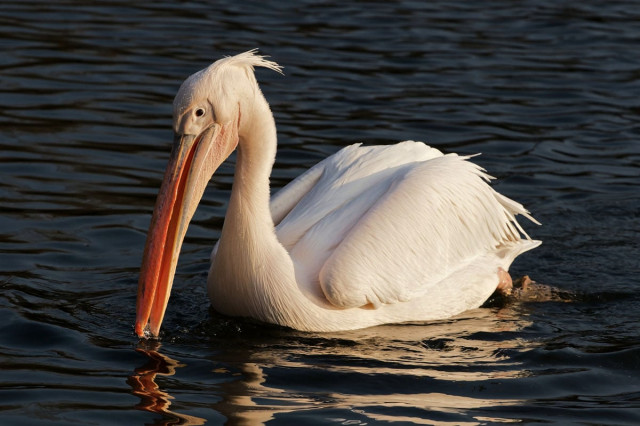Eight-year long wait: 30 rare white pelicans pay surprise visit to Sandspit
These rare birds are believed to be restricted to a few Central Asian countries.

The white pelicans are threatened species but they visit different countries, including Pakistan, during the winter season. PHOTO: WIKIMEDIA
Earlier, pollution and hunting practices had pushed the species out. The dalmatian pelican or white pelicans, one of the three kinds of pelicans, were seen on Sunday evening at the Wetland Centre of the World Wildlife Fund-Pakistan (WWF-P). Their exact number is not known but WWF-P officials believe the count is over 30.
These rare birds are believed to be restricted to a few Central Asian countries. The white pelicans are threatened species but they visit different countries, including Pakistan, during the winter season.

Their arrival in Pakistan has been seen as a positive sign, especially in Sindh’s different areas, including Keenjhar Lake, Chotyari Wetlands [Sanghar], Khipro Wetlands, Deh Hakro [Nawabshah], Manchar Lake and other freshwater bodies across the province.
The arrival of these birds in such a count has not been witnessed in the last eight years. “We haven’t observed them in such numbers in the last eight years. It’s a good sign,” said WWF-P’s Wetland Centre in-charge Naveed Soomro.
“The reasons of their arrival could be a strong check on hunting practices,” said Soomro. “Yes, another reason is the healthy mangrove forest.”
The hunters anxiously, wait for the arrival of these threatened birds. Its meat is eaten and their oil is used for pain relief. “I am in search for pelican’s oil,” a man from Larkana, Asghar Ali, told The Express Tribune. “My cousin has a body ache and it has made his job and physical movement troublesome. I’ll pay any amount to a person who could provide me with the same,” he added.
Confirming the widely-held belief, WWF-P’s consultant and birds and ecology expert Jahangir Durrani said, “Yes, the bird’s oil and meat has been used for treatment but it is simple ignorance. People kill these birds for such things but I don’t believe it helps.”
Durrani was of the view that migratory birds from Central Asia visit Pakistan from October, saying that hunting, lack of fishing and pollution are some of the major reasons which have limited their arrival, particularly in Karachi.
“Environmental pollution kills fish and when there is no fish, these birds do not fly in,” Durrani explained. “Adult birds haven’t come here,” he joked, adding that the young ones don’t know of the kind of hunters in these areas. Ali said that he has asked some friends in the rural areas, who had promised to arrange the oil. “People will rely on alternatives or will visit doctors, if the oil is not available,” he said.
The experts said that the authority should play a significant role in attracting more birds to Pakistan’s waters in the coming years.
Published in The Express Tribune, December 3rd, 2013.



















COMMENTS
Comments are moderated and generally will be posted if they are on-topic and not abusive.
For more information, please see our Comments FAQ